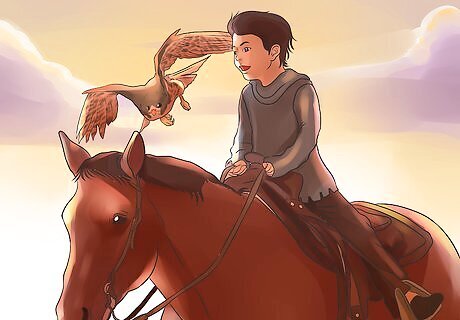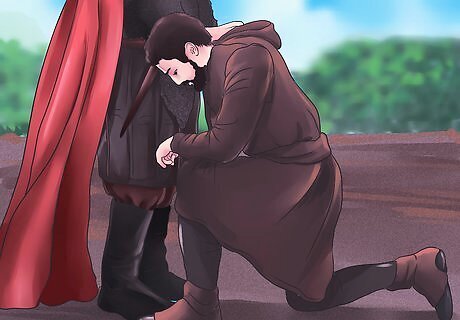
views

Think of a story. Be sure to have a thick plot because the quest story is not only about the outward physical journey but also involves the protagonist's inner struggles, and often feeds into a much bigger picture, such as saving a kingdom, rescuing a leader, solving a bigger puzzle, and so forth. Consider using flashbacks. These are formed when you take out a few events from a sequence of events and place it somewhere else to create a flashback or to account for such "time slips".

Include solid, believable and interesting characters. Your characters must each have definite characteristics, such as being bold, mild, curious, misbehaved, confused, and so forth. It helps to create character sheets ahead of writing, to help you to realize the whole of this person and to help imagine how he, she or it would progress throughout the tale. What weaknesses, problem behaviors/attitudes or less-than-stellar aspects does each character have? Choose things in need of resolving, or that can be made much of, even if unresolved. Include at least one character who is somewhat lost/confused/befuddled and is a bit of a seeker. Seekers tend to go on quests, to fix internal issues as much as solving external problems. Avoid the Mary Sues, those "totally perfect" people. If you think that you know such people in real life, remind yourself to take off your rose-colored glasses.

Include strange, curious, daunting or dangerous lands. A quest usually involves crossing through an area of land, realms or such places. However, you don't have to make it just land; it could actually be a dreamscape, a drug-induced haze state, a parallel universe or a metaphorical "place". That all depends on how clever you are with consistently writing about alternate realities. If you would like to keep it slightly less complicated (although still complex), lands or realms work well for the quest meme.

Note that every quest starts with someone going alone or a pair of persons going together. Along the way, the person or pair encounters various people and creatures who help and later join the character on the quest. Eventually, a small contingency is formed and is dedicated to the quest. Of course, each character comes with his, her or its own reasons and baggage for being part of the quest, just to add to the tensions, the excitement and the disappointments that form part of quest lore. If you send out someone on his, her or its own, don't make this person or creature perfect from the get-go. Your story will fizzle quickly. It may well be that this person is viewed as courageous, amazing or incredible by the local townsfolk or whomever, but that's all the more reason to show this person or creature has many weaknesses and bring them to the light throughout the journey. If a pair goes, be creative about their reasons for being together. Love is not enough; if that is used as the initial motivator, you will need to find the flaws in that love and test it to its absolute extreme to keep things interesting. Possible pairings could include: siblings, parent and child, neighbors, two diametrically opposed individuals, master and apprentice, leader and foot soldier, rich and poor, and so forth. If you make them equals, there needs to be something uniquely fascinating about their individual characters to keep them interesting.

Be sure to include conflicts in the plot. Conflicts make the quest the interesting read that it is. Things are bound to go wrong, unusual things crop up and now and then, members of the party tend to lose one another. Conflicts can include disputes, dislikes among the members of the questing group, discomfort, meeting enemies and running or fighting, magical transformations that create havoc, practical jokes, rifts in the traveling party, another love interest, animal/magical beast attacks, and so forth. Mix the conflict up, to keep the pace edgy, exciting and unique. Intersperse the conflicts with some quieter times. During these times, don't cause a lull of boredom; instead, use these to explore the feelings, thoughts and desires of the characters and to fill the reader in on much-needed news about how the bigger picture story is progressing (such as whether Kingdom X has almost expired due to the quest object not being back there yet, or the way ahead becoming more treacherous than anyone in the traveling party has yet comprehended, and so so forth).

Finish the tale with a believable resolution. It's completely up to you whether or not it's a happy ending with a successful resolution to the quest. That's certainly one way of writing it. However, shades of "happiness" are probably more realistic, such as perhaps finding the intended reason for the quest, only to realize that it hasn't resolved internal longings or needs, or that it's not quite what everyone expected it to be, and so forth. Remember that life goes on after a quest and while wrapping it up neatly is enjoyable, some glimmer of the future eruptions can be a good way to segue into your sequel.




















Comments
0 comment